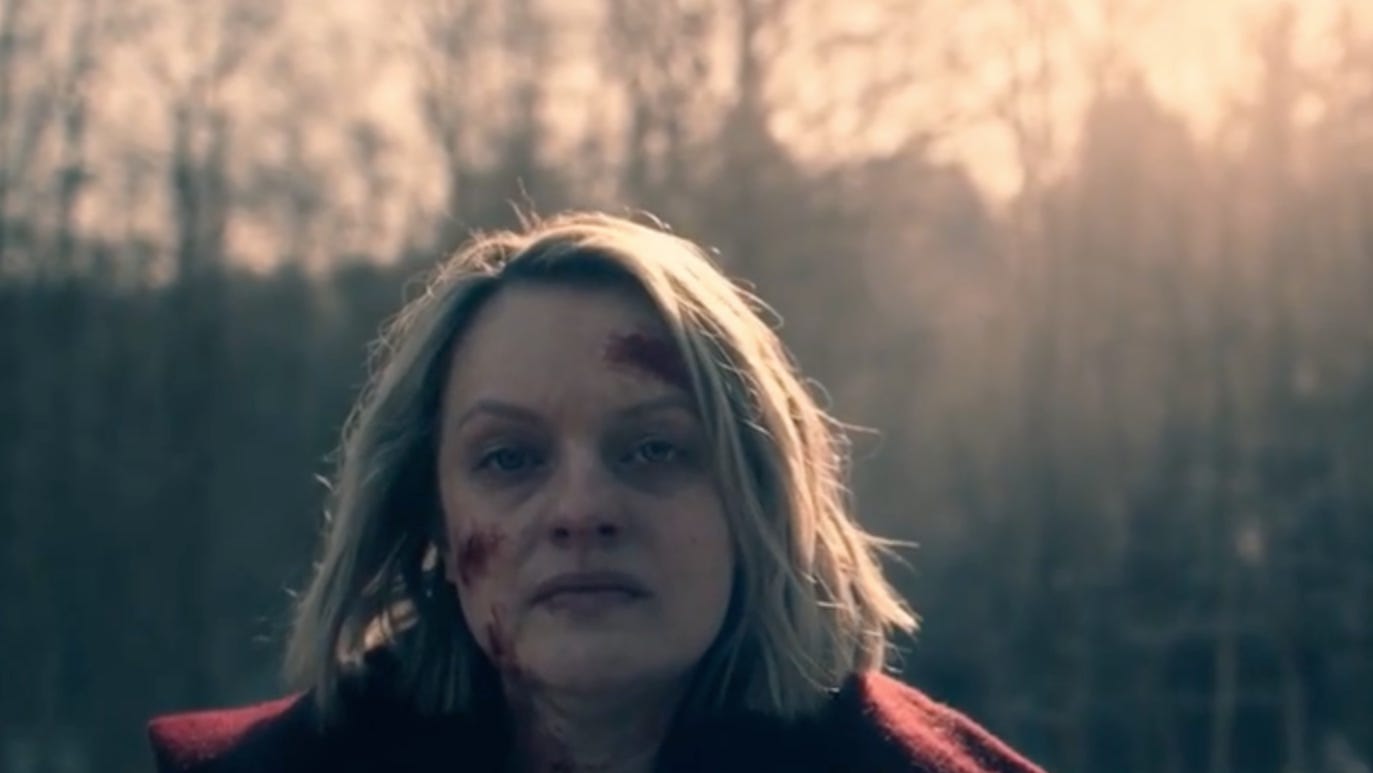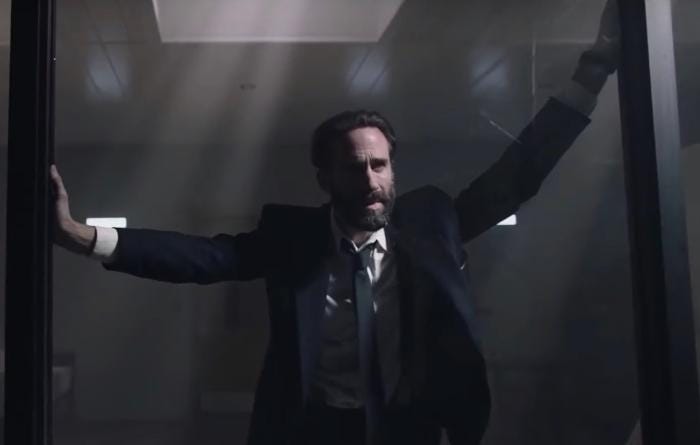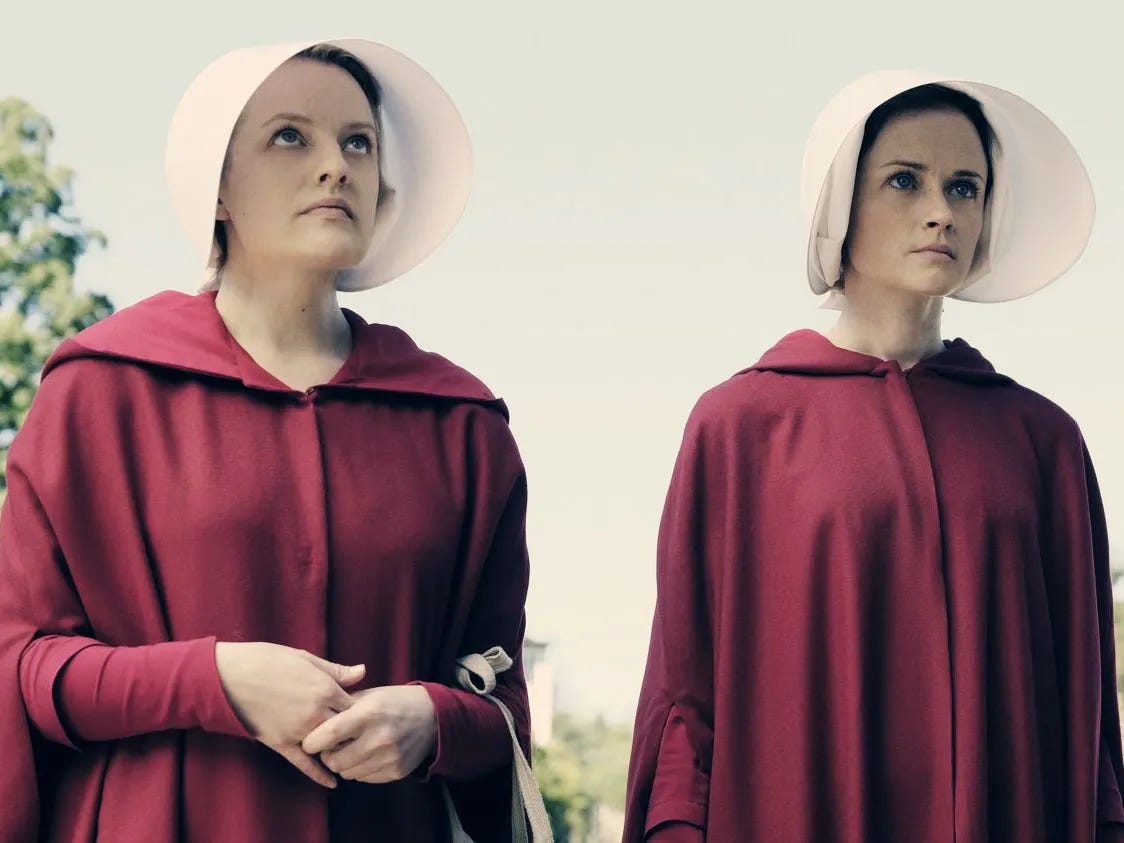Justice and Revenge in The Handmaid's Tale
Women - crazed, cold, cruel - getting (bloody) even isn't new, but the most recent season of The Handmaid's Tale presents a different take on anger and revenge
Content warnings: spoilers for The Handmaid’s Tale Season 4 and 5 (and actually 1, 2, 3 too). Discussion of physical and sexual violence.
Note from me: I’ve been writing this one and off for a couple of months, taking breaks, between rewatching every series. So I’m with you when I say…Go steady. If it’s too difficult, the next newsletter in a few days is on Suzie Too and, WELL, couldn’t be more different.
“I loved it,” says June afterwards.
And she did. They all did. Each woman who enters the woods one by one, flanking the ex-handmaid (Elisabeth Moss). Who set off in pursuit of her rapist and ex-Commander (Joseph Fiennes) as the fate that lies ahead, there in No Man’s Land, dawns on him with just one word from June: “Run”.
The women, also of Gilead, share something, the very thing that brought them there that night: they too had been brutalised. In the same way, in different ways. Each degradation, each violation both a stranger and kin. And they wanted, needed, revenge. Revenge that could be their justice.
Those final seconds of The Handmaid’s Tale Season 4 - You Don’t Own Me playing as Fred’s body is torn apart; feet, fingers and teeth separating flesh from bone - are shocking in their brutality, but also inescapable. For Fred and for June. For each and every woman that runs in the mud with them.
As Season 5 opens at daybreak, they emerge from the woods smeared in Fred’s blood. They go for breakfast: June's the last to arrive and the first to pile her plate high with pancakes, eggs and bacon. The others join her, barely a breath taken, not a word spoken, as they bite and swallow, chewing hard. We see, hear, the appetites of women finally sated and satisfied in mind and soul, soon to be in body.
June, though knowing her own fate (imprisonment for his murder), is happy, lighter. The ungenerous can mock June’s set jaw and hard stare throughout the first four seasons, but that’s precisely what unexpressed rage looks like. Rage controlled, contained, by someone else. Running through every bone, every muscle even as your body remains still and your mouth stays shut. As June says about the ‘relationship’ with her Commander: “Don’t run, don’t kick, don’t scream…don’t bite.” There, in the woods, they do all four. As does he.
And that’s really not how it’s meant to go. Or how it does go on screen, in drama, where revenge - especially female revenge - is the consequence of wild, uncontrolled emotion. A moral, personal failing. A vivid split in the core that drags in her as it does him. Eventually, inevitably, a terrible, terrible mistake. One that leaves her forever traumatised, regret supplanting rage. It’s a surefire path to more pain, they say. It won’t make you feel better. You can’t hurt me any more than you have, the women of The Handmaid’s Tale shout in response. I feel better already.
Radically, June - though hellbent on revenge - isn’t hysterical, isn’t unhinged. She has been beaten, raped, dehumanised, had her child ripped out of her arms - and she’s pin sharp on why she needs (one of) those responsible to pay. “He raped me, he was a monster, he deserved to die,” she says coolly. Her anger is channelled; a tool, as well as a weapon. When she chooses to unleash it on Fred, teeth bared, it’s exactly that: a choice.
In truth, it didn’t have to end in what remained of Fred strung up on the wall. There could have been another future for Fred, for June. By then her anger was bone-deep: a fuse lit when Commander Waterford first lifted Offred’s red dress to perform the ‘ceremony’ - the monthly ritualised rape - but justice was still a (distant) possibility. One day, in another land, another life. A better one.
But the slow burn became a big bang in this better land, her other life, when June is told by the Canadian government - who’d arrested Fred for war crimes including rape and sexual slavery - that, in return for intelligence on Gilead, he’ll be pardoned.
June had tried to do it the official way, the ‘right’ way. In ‘Testimony’ the eighth episode of series four, June gives evidence in preliminary proceedings against both Fred and Serena (Yvonne Strahovski) . While she speaks, factually recounting years of brutal attacks in measured words, the camera holds on her, refusing to pan and capture the reaction, the perspective, of those she’s testifying against.
But it isn’t just for herself she speaks, her voice wrung of the emotion and the anger, we’re advised against. “Mine is just one voice,” she reminds the court, the Waterfords, and us. “Countless more will remain unheard, imprisoned by men like Fred Waterford. Women, my friends..” - at this her voice cracks, briefly - “…who lost their lives and can never be heard. It is for those women that I ask the International Criminal Court to confirm the charges against this man and put him on trial. I ask for the maximum possible sentence. I ask for justice.”
It’s an ask - not a plea, for June is past pleading - that’s not ignored, but rejected.
“I told my story. I got up and I told them everything. They know what he was, what he did, how it felt. And they made a deal with him anyway,” says June upon hearing the news of his pardon, taking it with the resignation that comes with grim inevitability. The grim inevitability that sits like sediment within all women. Not just the one in three of us who’ve been the victims of sexual violence. Or those of us in the 99% who never see our attackers convicted. Or those of us in the 98.7% who never even see them charged. Just as rape is decriminalised in Gilead - and as June found, similarly in Canada where it’s still technically a crime - so it is in the real word.
Yet, we’re still told, as she was: believe in justice. Let it take its course. Submit to the process. Even though ‘justice’ at this point is nothing more than a concept. One that completely dissolves upon contact with reality. So, as June loses something she knows deep down she was never going to receive, a match is put to her rage. Rage, a feeling that lived within her since that first night, becoming righteous action. There is no justice to be found, only created.
At this, we’ll say that we understand the rage of a woman denied the due process she deserves, before telling her to process it, then let it go. She must. That’s ‘healthy’. That’s the social contract that exists, still. Even when we know about, are, the one in three and the 99% and the 98.7%. We cry, we are counselled, we release it. You cry, you are counselled, you release it. I cry, I’m counselled, I release it. Anger evaporating into air.
Sometimes, some of us tell you that’s how it is. That sure, absolutely, we feel better. That we don’t think about. That we’re over it. But we’re lying to you. Instead we dig and dig and bury not just our injustice and rage beneath the earth, but our entire selves, soil filling our throats.
Through June, who doesn’t take this option, we’re given the catharsis we don’t get to either experience or see. Even as we’re told that makes her (and would make us) as bad as them, that this proves that she’s a ‘product’ of Gilead, has been infected with their brutality. Particularly as the attack on Fred is indistinguishable from a Particicution: the public murders (‘salvagings’) that the handmaids took part in.
These ritualised state-ordered killings, in which men usually accused of violence against handmaids, were ripped apart in a frenzy by the bare hands of these women, were invented in part so that handmaids could exorcise their anger (the theory being that they’d not have any left in the tank to turn on their commanders, wives or Gilead at large). In the attack on Fred, June and the other women - primarily ex-handmaids - took the very thing used to manipulate and control their anger and used it against him. Fred is guilty: he’s a rapist, a perpetrator of the very worst violence against women. And justice, Old Testament style, was always the Gilead way: “The righteous will rejoice in vengeance and wash their feet in the blood of the wicked”.
But crucially: unlike those who govern Gilead, June doesn’t expect her behaviour to be without consequence, without its own response of justice. When she ties the laces of her boots that night and slips out of her front door, she does so knowing what comes after. That she’ll be separated from her husband Luke (O-T Fagbenle) and daughter Nichole. That she’ll be taken from the very life that she fought so long to reach. A decision she makes with certainty and resolution. For it isn’t about getting away with it, for her actions to disappear on the wind. She wants the world to know that he did something so bad, so entirely unforgivable. Not just to her, but to others. And that actually, this was an act of vengeance, not revenge. Retributive justice.
You can, of course, argue about whether Fred’s fate was justified, could ever be justified (and June’s own evasion of ‘justice’ as she isn’t charged), but the wider, actual point is that a woman’s rage, the revenge she takes on the back of it, isn’t always the product of a broken mind. Something to be silenced and squashed. And what’s more, can be part of reclaiming of a broken body. Revenge, here in the real world, can be sharing your story loudly, without shame; refusing to use the palatable, respectable words we’re told to; fantasising happily about what you could do but wouldn’t; refusing to let go of your rage; refusing to forget; refusing to forgive.
June too chooses an entirely different revenge for Serena. In episode seven of series 5 (called, pertinently ‘No Man’s Land), a pregnant Serena, on the run from her own Gilead oppressors, goes into labour with June by her side. June chooses to save both the baby and Serena , a decision that’s been called entirely ‘uncharacteristic’. Which is to miss the point. The greatest pain June ever suffered was losing her child and while she will absolutely tear off Fred’s cheek with her teeth, she will not cause that same pain to a mother. She also knows, in that moment, that Serena understands what it is to be reduced entirely to her biology, to be a shell for male use, their needs and desires. For her entire worth to be bound up in bearing their child. When she also knew what is was to be a woman, with her wants, her own longings.
‘“A vessel” that’s what you thought I was,” says June. “But we were who we were, where we came from, what we wanted. None of that mattered to you. To any of you…We mattered. We were, we are, people. We have lives. And that’s why I’m going to save yours, Serena. Because this isn’t Gilead. And I am not you.”
This doesn’t mean she doesn’t still seek vengeance though. In the following episode ‘Motherland’, June refuses to help Serena (currently in a detention centre) find an advocate or sponsor. When June declines, Serena is confused. She thought she had been absolved, to June’s bemusement. “No, I can never forgive you,” she says emphatically.
For it’s an uncomfortable truth that forgiveness is for some, but not for everybody. It’s not always the best outcome or even an appropriate response. Who decreed that we all deserve redemption, or even a shot at it? That every victim or survivor is soothed and saved by gifting that to another? That this is not just their responsibility but a command anyone gets to make? “Why the fuck do you think you deserve forgiveness?” demands June of an Aunt seeking it.
Why the fuck indeed. Ask for it, beg for it if you must, but don’t expect it.
This isn’t to say that these events won’t imprint on June, change her in some way. As it does for all of us. But she was fundamentally changed, down to her DNA, when she was first forced on her back. To accept that isn’t to allow ‘them’ to win: we can only truly condemn the act, understand its gravity, when we hear the bell of trauma and rage as it rings. And let it ring, and ring, and ring.
The Handmaid’s Tale and June let it ring.
Refuse to smile, not fight, not bite.
We can all refuse too.
-
All series of The Handmaid’s Tale is on All4 channel4.com/programmes/the-handmaids-tale
Rape Crisis can be contacted at rapecrisis.org.uk







Jaw dropping outstanding piece. Strangely enough I’ve just watched the handmaids tale for the first time so quite apt. x
Standing up & clapping here 👏. Excellent piece, getting to the guts of it as always. X